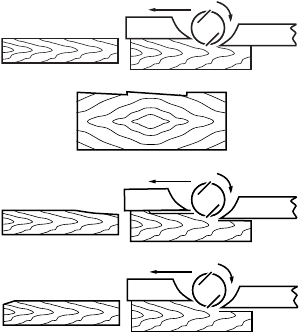
8
installation bolts with the socket wrench. The drum
cover comes off together with the blades. (Fig. 7)
2. To install the blades, loosely attach the adjusting plate
to the set plate with the pan head screws and set the
mini planer blade on the gauge base so that the
cutting edge of the blade is perfectly flush with the
inside flank of the gauge plate. (Fig. 8)
3. Set the adjusting plate/set plate on the gauge base so
that the planer blade locating lugs on the set plate rest
in the mini planer blade groove, then press in the heel
of the adjusting plate flush with the back side of the
gauge base and tighten the pan head screws.
4. It is important that the blade sits flush with the inside
flank of the gauge plate, the planer blade locating lugs
sit in the blade groove and the heel of the adjusting
plate is flush with the back side of the gauge base.
Check this alignment carefully to ensure uniform
cutting.
5. Slip the heel of the adjusting plate into the groove of
the drum.
6. Set the drum cover over the adjusting plate/set plate
and screw in the three hex flange head bolts so that a
gap exists between the drum and the set plate to slide
the mini planer blade into position. The blade will be
positioned by the planer blade locating lugs on the set
plate. (Fig. 9)
7. The blade’s lengthwise adjustment will need to be
manually positioned so that the blade ends are clear
and equidistant from the housing on one side and the
metal bracket on the other.
8. Tighten the three hex flange head bolts (with the
socket wrench provided) and rotate the drum to check
clearances between the blade ends and the tool body.
9. Check the three hex flange head bolts for final
tightness.
10. Repeat procedures 1 - 9 for other blade.
For the correct planer blade setting
Your planing surface will end up rough and uneven,
unless the blade is set properly and securely. The blade
must be mounted so that the cutting edge is absolutely
level, that is, parallel to the surface of the rear base.
Refer to some examples below for proper and improper
settings.
(A) Front base (Movable shoe)
(B) Rear base (Stationary shoe)
EN0004-1
Change of chip discharge direction
(Fig. 10)
Chip discharge direction can be changed to the right or
left. To change the direction, pull out the stopper while
turning it slightly backward and fit in it in one of two
openings on the opposite side of chip discharge so that
the recessed part fits to protrusion. (Fig. 11)
Dust bag (accessory) (Fig. 12)
Attach the dust bag onto the chip discharge opening.
The chip discharge opening is tapered. When attaching
the dust bag, push it onto the chip discharge opening
firmly as far as it will go to prevent it from coming off
during operation.
When the dust bag is about half full, remove the dust bag
from the tool and pull the fastener out. Empty the dust bag
of its contents, tapping it lightly so as to remove particles
adhering to the insides which might hamper further
collection. (Fig. 13)
NOTE:
• If you connect a Makita vacuum cleaner to this tool,
more efficient and cleaner operations can be
performed.
Connecting a vacuum cleaner (Fig. 14)
When you wish to perform clean planing operation,
connect a Makita vacuum cleaner to your tool. Then
connect a hose of the vacuum cleaner to the chip
discharge opening as shown in the figures.
Correct setting Although this side view cannot show it, the
edges of the blades run perfectly parallel to
the rear base surface.
Nicks in surface Cause: One or both blades fails to have edge
parallel to rear base line.
Gouging at start Cause: One or both blade edges fails to
protrude enough in relation to rear
base line.
Gouging at end Cause: One or both blade edges protrudes
too far in relation to rear base line.
(A)
(B)
(B)
(A)
(A)
(B)


















